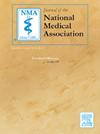黑人成年人的 COVID-19 疫苗接种率和意向:全县在线调查分析。
IF 2.5
4区 医学
Q1 MEDICINE, GENERAL & INTERNAL
引用次数: 0
摘要
背景:在冠状病毒 2019(COVID-19)疾病负担方面存在明显的种族不平等:冠状病毒 2019(COVID-19)疾病负担中存在明显的种族不平等,而最初的疫苗推广并未公平地解决这些不平等问题:我们对 2021 年 5 月至 2022 年 1 月期间仅限于宾夕法尼亚州阿勒格尼县黑人成年居民的全国 Facebook 调查进行了分析。我们评估了人口统计学、健康状况、社会规范背景、感知到的种族歧视以及对 COVID-19 缓解策略的看法与疫苗接种率和接种意向之间的关联,并比较了未接种者报告的疫苗犹豫原因和不接种疫苗的意向。对未接种疫苗的受访者子集进行了多变量逻辑回归,以探讨与疫苗接种意向相关的变量:在 1,552 位受访者中,超过 85% 的人在调查时接种了 COVID-19 疫苗。与未接种者相比,接种者的年龄更大、受教育程度更高(P 结论:接种者的年龄和受教育程度均高于未接种者(P 结论:接种者的年龄和受教育程度均低于未接种者):在阿勒格尼县回答调查的黑人成年居民中,COVID-19 疫苗接种率较高。未来的工作应继续努力解决不信任的原因,医疗保健机构和政府应重点关注提高其可信度,同时采用循证策略提高疫苗接种率。此外,还应继续努力从未接种疫苗者和疫苗接种犹豫者的角度出发,为正在进行的健康公平干预提供信息。本文章由计算机程序翻译,如有差异,请以英文原文为准。
COVID-19 vaccine uptake and intention of Black adults: A county-wide analysis of an online survey
Background
There are demonstrated racial inequities in coronavirus 2019 (COVID-19) disease burden, and the initial vaccine rollout did not equitably address these disparities.
Methods
We conducted analyses of a national Facebook survey restricted to Black adult residents of Allegheny County, Pennsylvania for the period of May 2021 to January 2022. We assessed the associations between demographics, health status, social normative context, perceived racial discrimination, and beliefs about COVID-19 mitigation strategies on vaccine uptake and intention and compared reasons reported for vaccine hesitancy, and vaccine non-intention among the unvaccinated. Multivariable logistic regression was conducted on a subset of unvaccinated respondents to explore variables associated with vaccine intent.
Results
Over 85 % of 1,552 respondents were vaccinated against COVID-19 at the time of the survey. Compared to the unvaccinated, vaccinated respondents were older and more highly educated (P <0.001), more likely to have at least one chronic health condition (P =0.03) and had a stronger social normative context in support of vaccination (P <0.001). Vaccinated respondents also reported greater personal adherence to wearing face masks when out in public and were more likely to report positive perceptions of the effectiveness of mitigation strategies (e.g., face masks) towards preventing COVID-19 transmission (P <0.001).
Unvaccinated respondents were more likely to report intention to be vaccinated if they felt that face masks were very effective in the prevention of COVID-19 compared to those who felt this mitigation strategy was only moderately/slightly/not at all effective (OR: 4.52; 95 % CI: 1.23–16.59; P =0.02) and if they did not report mistrust in the government or COVID-19 vaccines compared to those reporting mistrust (OR: 7.72; 95 % CI: 1.34–44.64; P =0.02).
Conclusion
COVID-19 vaccination levels were high among Black adult residents of Allegheny County who responded to the survey. Future efforts should continue to strive towards addressing reasons for mistrust with focused attention from healthcare institutions and the government on increasing their trustworthiness, alongside employment of evidence-based strategies to increase vaccination rates. Additionally, efforts should continue to engage unvaccinated and vaccine hesitant persons’ perspectives to inform ongoing health equity interventions.
求助全文
通过发布文献求助,成功后即可免费获取论文全文。
去求助
来源期刊
CiteScore
4.80
自引率
3.00%
发文量
139
审稿时长
98 days
期刊介绍:
Journal of the National Medical Association, the official journal of the National Medical Association, is a peer-reviewed publication whose purpose is to address medical care disparities of persons of African descent.
The Journal of the National Medical Association is focused on specialized clinical research activities related to the health problems of African Americans and other minority groups. Special emphasis is placed on the application of medical science to improve the healthcare of underserved populations both in the United States and abroad. The Journal has the following objectives: (1) to expand the base of original peer-reviewed literature and the quality of that research on the topic of minority health; (2) to provide greater dissemination of this research; (3) to offer appropriate and timely recognition of the significant contributions of physicians who serve these populations; and (4) to promote engagement by member and non-member physicians in the overall goals and objectives of the National Medical Association.

 求助内容:
求助内容: 应助结果提醒方式:
应助结果提醒方式:


